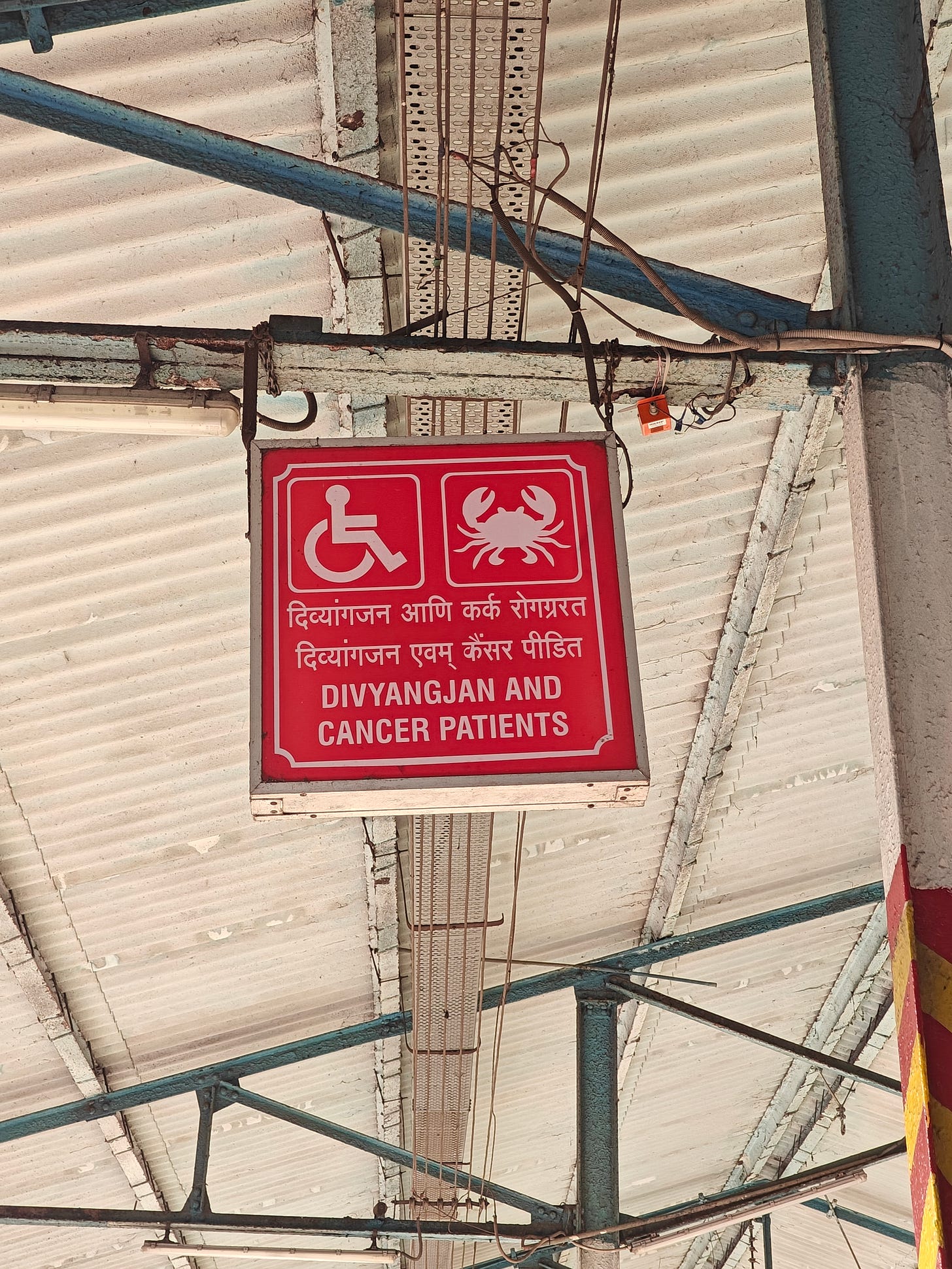New work has meant getting out of the home and heading to a physical office every week. Making the trek from the Harbour to the Western line in Mumbai during peak hours is hard enough as it is. I've had to find ways to do this while being immunocompromised and unvaccinated. In the quest to find a mythical perfect solution, I've tried every mode of transport to get from Vashi to Mahim. On one such experimental day, I made a discovery. ↓
For the first time in my life, the big L had come to my rescue. It had given me a secret portal to escape the famous Mumbai train crush. That a whole train compartment like this existed in India, where even ‘normal’ facilities are rickety at best, felt like a miracle. I knew there were provisions for people with disabilities, but I didn't realise that cancer patients were part of the mix too. Never mind that each group’s problems are completely different.
That first time entering the compartment was like joining the kingdom of the unseen. A secret, sparsely populated society of masks, canes, and baby bumps revealed itself to me as I secured myself on a shiny blue empty row. A few degrees to the left was the general compartment—a box of sweat and skin separated by a steel railing. This open blue seat with its accompanying breeze was a panacea. I kept wondering if I'd need to dramatically cough to prove my membership, or if my mask would be enough of a VIP pass.
Subsequent visits were not always pleasant, though each left me ruminating for days. One time, in the rains, I had to get off at Sewri and wade through floodwater. I've done this before, and it's evoked disgust and humour in the past. But this time around, fear had joined the ranks. This would be a really stupid way to kill myself after all that I've been through!
Worse yet, once I got stuck in the crowd, overwhelmed with mortal fear and at high risk of catching an infection. I stupidly boarded the compartment on the ladies' special train, which had ironically become the main way for men to travel to work! Being a man was apparently a handicap on a ladies' special train. A young man pushed me on the way in. In anger, I asked, "Aapko kya cancer hai? Handicapped hai?" The moment those words left my mouth, I felt like a cranky old lady. His response didn't make it better: "Nahi, mujhe pahunchna hai." I was seething with anger, then sadness, realising that at least I had better options, unlike many other folks there.
Being immunocompromised makes ‘normal’ situations feel like ticking time bombs: sharing food, taking the train, getting into a lift—each an opportunity for the system to go on high alert. Germs lurk in every corner, and in a place like Bombay, personal space is a distant dream for most. Some reports indicate that up to 60% of cancer deaths are infection-related, especially in blood-related malignancies. And so, I have my spidey sense activated in every interaction. The next splash of sputum, smoke, or sweat could come from anywhere. My new German immune system needs time to deal with India's idiosyncrasies :)
—
In medical news, I was diagnosed with mild osteopenia in my arms, likely because of menopause and the transplant itself, which leads to bone loss. I haven't strengthened my upper body as well as the rest of it in the past, and that shows. My cholesterol is sky high, but I have brought down my HbA1c. I also had my first mammography and pap smear this month. That deserves a whole post for itself. Soon. Some abnormal cells have shown up in my cervix, which could be because of all the chemo I've had. Or not. I don’t know. Perhaps the scariest thing is that my haemoglobin and white blood cell counts have shown a drop in my latest results. I have a bone marrow biopsy scheduled for next week, along with all the usual tests, a meeting with the gynaecologist in addition to Linn (to check if I need a cervical biopsy). And then there will be another lymphocyte infusion, my eighth, but only if Linn says my liver values are okay.
It's hard to describe what it feels like to deal with the grief of loss: loss of what my body was once capable of, how life was before I became immunocompromised, of a time when worry wasn't constant, while simultaneously facing the uncertainty of relapse. Just when I feel I've reclaimed a few days of my old self, new information, symptoms, or test results appear to remind me: stay alert, stay vigilant, it's not over, or it may be over soon. It's tough. Like being pushed along in a sea of people trying to board a train—uncomfortable, sweaty, gritty, never certain that you'll manage to switch trains at Kurla.
I don’t know what next week will bring. But tomorrow, I’ll likely take a cab to Mahim.




